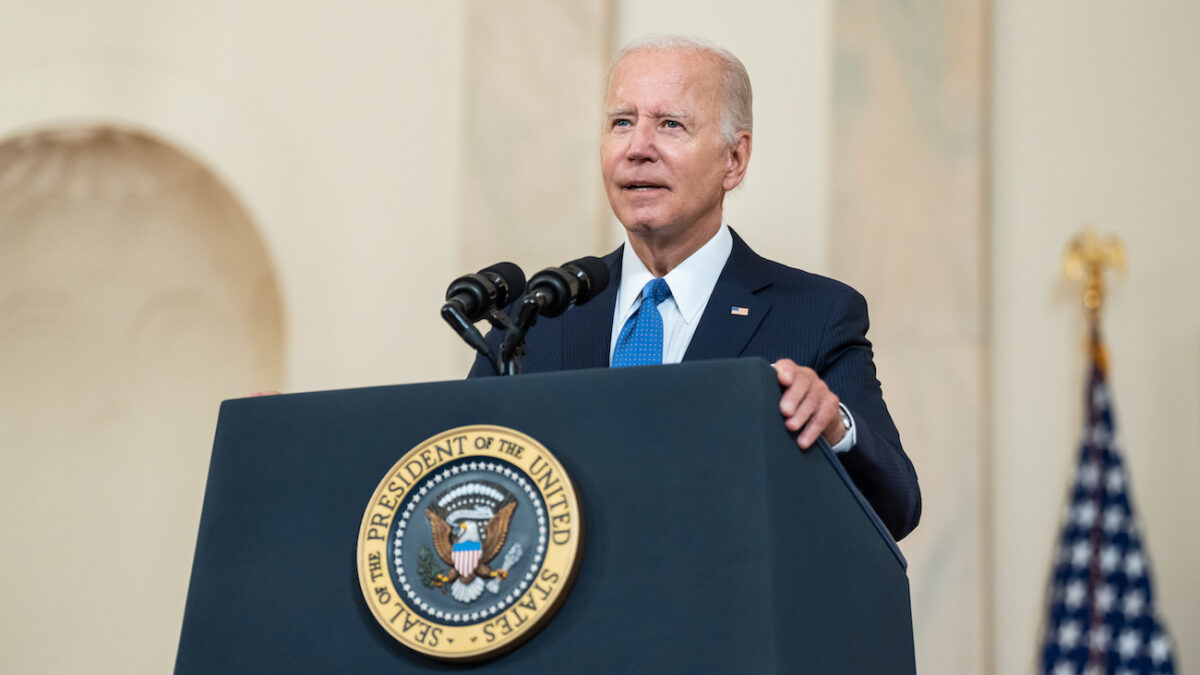The Supreme Court will decide whether the Biden administration acted lawlessly when it authorized the cancellation of hundreds of billions of dollars in student loans. The high court announced on Thursday that it would expedite an appeal brought by the Biden administration challenging a lower court’s injunction freezing its loan “forgiveness” program, promising a hearing in February on the issues.
Until then, the Supreme Court will let stand the injunction the Eighth Circuit issued in Nebraska v. Biden. That injunction prevents the Biden administration from cancelling student loans of up to $20,000 per borrower, pending resolution of the legal challenge to the debt-forgiveness plan brought by six states: Arkansas, Iowa, Kansas, Missouri, Nebraska, and South Carolina.
In petitioning the Supreme Court for relief, the Biden administration initially sought an order vacating the Eighth Circuit’s injunction, but the administration argued alternatively that, if the high court declined to dissolve the injunction, it should instead hear the case on appeal on an expedited schedule. The Supreme Court’s decision to take the case on appeal presents a unique situation, given that the Eighth Circuit has not yet addressed the merits of the states’ lawsuit.
Come February then, the Supreme Court will need to decide whether the lower court erred in finding that the states lacked standing to challenge the Biden administration’s cancellation of student loans. The states present an array of arguments for why they had standing, or the legal ability to sue, with Missouri advancing the strongest argument for standing.
Specifically, Missouri maintains loan forgiveness will harm the state because the state, throughout its Missouri Higher Education Loan Authority, or MOHELA, raises funds to support grants and further loans by processing student loans. Fewer student loans to process, because of loan forgiveness, means fewer resources flowing to MOHELA, according to the state, and thus Missouri has standing, they argue.
If the Supreme Court concludes at least one state has standing to sue, the case can proceed. Then the question will be whether the Biden administration had authority under the HEROES Act to bail out the loans. The HEROES Act is a federal statute Congress passed following the 9/11 attacks that, among other things, authorized the secretary of education to “waive or modify any statutory or regulatory provision applicable to the student assistance programs” when the secretary deems it “necessary in connection with a war or other military operation or national emergency…”
Because the HEROES Act defines the term “national emergency” to include “a national emergency declared by the President of the United States,” the Biden administration maintained that its secretary of education can “modify” the student assistance programs by cancelling the principle of those loans. The states, as well as other plaintiffs who have challenged the loan-cancellation program, counter that canceling student loans is not a “modification” or “waiver” of a program and that, in any event, Covid did not cause the debtors’ financial difficulties.
Those challenging the Biden administration’s loan bailout also rely on “the major-questions doctrine,” which teaches that “a federal agency may regulate on issues of immense ‘economic and political significance’ only with explicit congressional authorization.” Because the student-loan forgiveness plan has immense “economic and political significance,” but the HEROES Act contains no explicit authorization to eliminate student loans based on income levels, the states argue the HEROES Act cannot be read to authorize the loan cancellation.
These arguments, while seemingly mundane, present a political risk to Biden when the Supreme Court hears the case in February, first because the Biden administration purposefully crafted the loan-cancellation program in a way to prevent anyone from obtaining standing. Such gamesmanship seems unlikely to impress the Supreme Court and, in fact, risks censure by the justices.
Likewise, oral argument over the scope of the HEROES Act seems likely to prove embarrassing to the Biden administration, given that its economy, policies, and runaway inflation hold more direct responsibility for the hardships experienced by many debtors than Covid. The justices will likely also push the Biden administration on separation-of-powers concerns, on Congress’s refusal to pass a loan-forgiveness plan, and on the president’s political posturing related to student loan cancellation.
The Biden administration may also face more tough questions if, before February’s hearing, the Supreme Court consolidates the government’s appeal of a Texas district court decision vacating the loan-forgiveness program. In that case, Brown v. United States, debtors filed suit against the administration arguing the government exceeded its authority under the HEROES Act and acted arbitrarily. The district court agreed and “vacated,” or declared a nullity, the loan cancellation plan.
The government appealed the district court’s decision and sought a stay pending appeal in the Fifth Circuit. In its filings to the Supreme Court in Nebraska v. Biden, the president explained that if the Fifth Circuit denies a stay, the Biden administration intends to seek relief from the high court. If it does, it is likely the Supreme Court will consolidate the Brown case with the Nebraska case.
The Biden administration will then face a doubly tough appeal because the Brown plaintiffs present a separate theory for standing. Namely, they claim that as students denied full loan cancellations, they suffered an injury. The Brown plaintiffs also expose the arbitrariness of the loan-forgiveness program, with one of the plaintiffs earning substantially less than the earnings cap, but still limited to $10,000 in loan forgiveness because the borrower had not received any Pell Grants while in college — a requirement established by the Biden administration to qualify for $20,000 in loan forgiveness.
The Biden administration might not care about losing in the Supreme Court, however, as it succeeded in rolling out the loan cancellation plan before the midterms. And if the Supreme Court eventually strikes the plan down, Democrats can pretend they kept their pledge to college students and place blame instead on the conservative justices — just in time to make the Supreme Court an issue for the next election.









